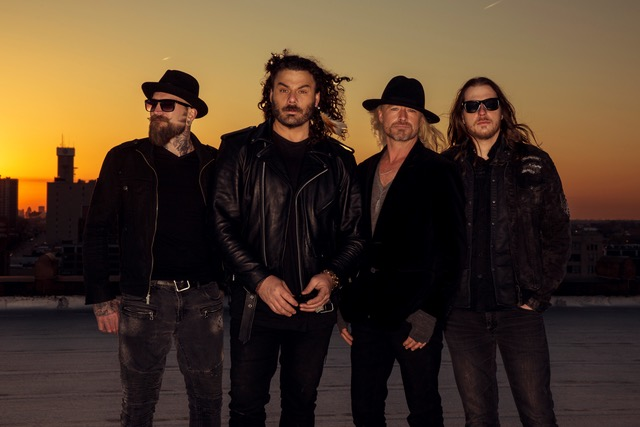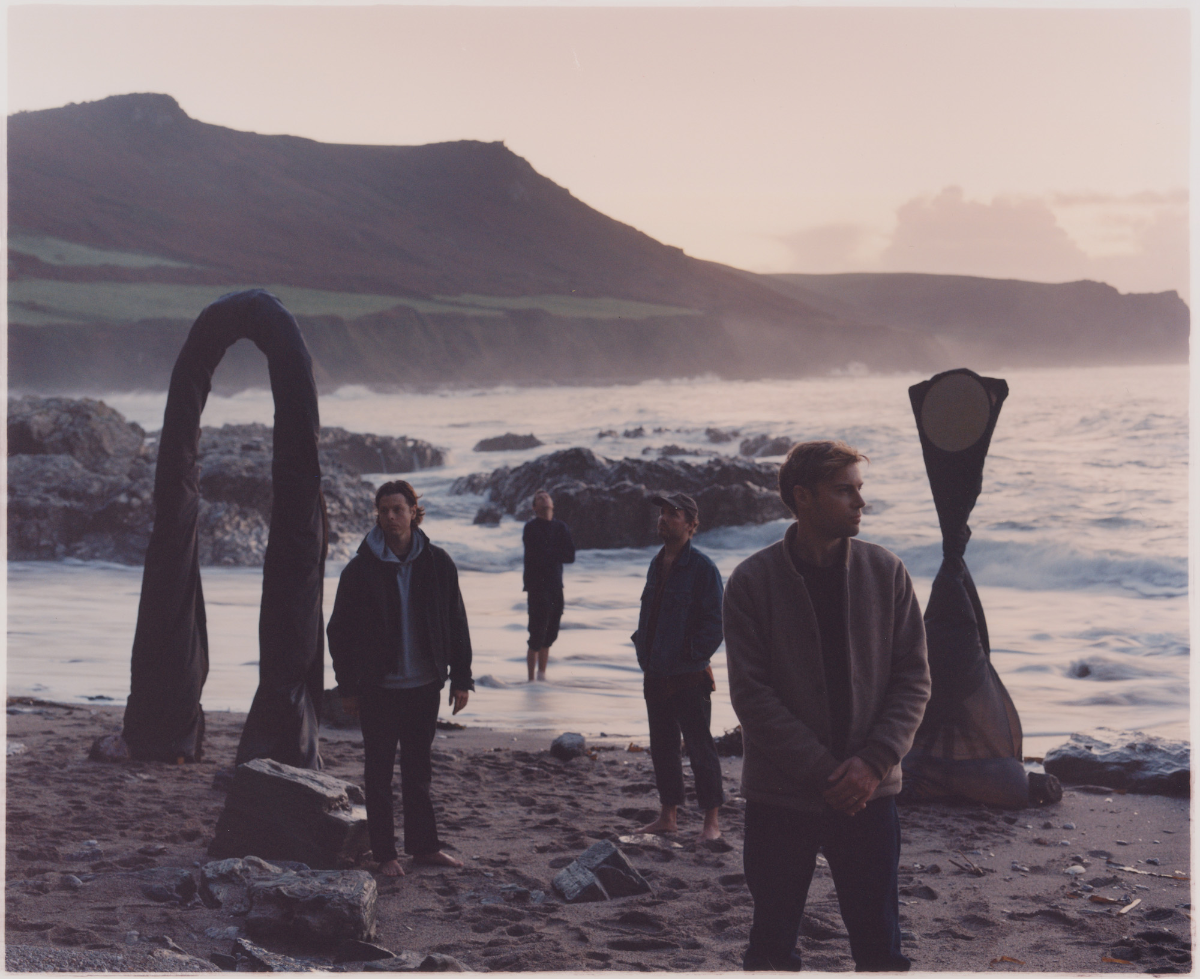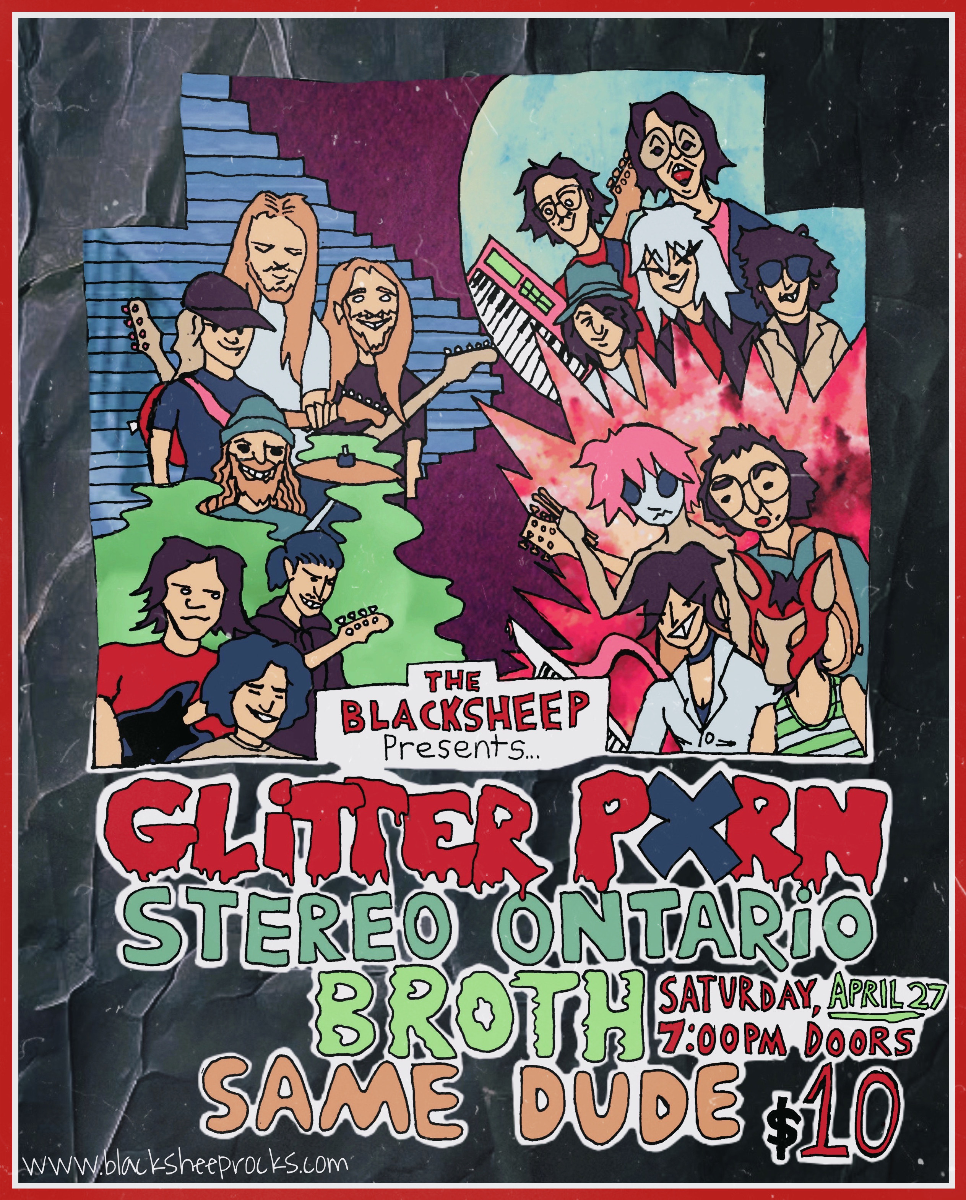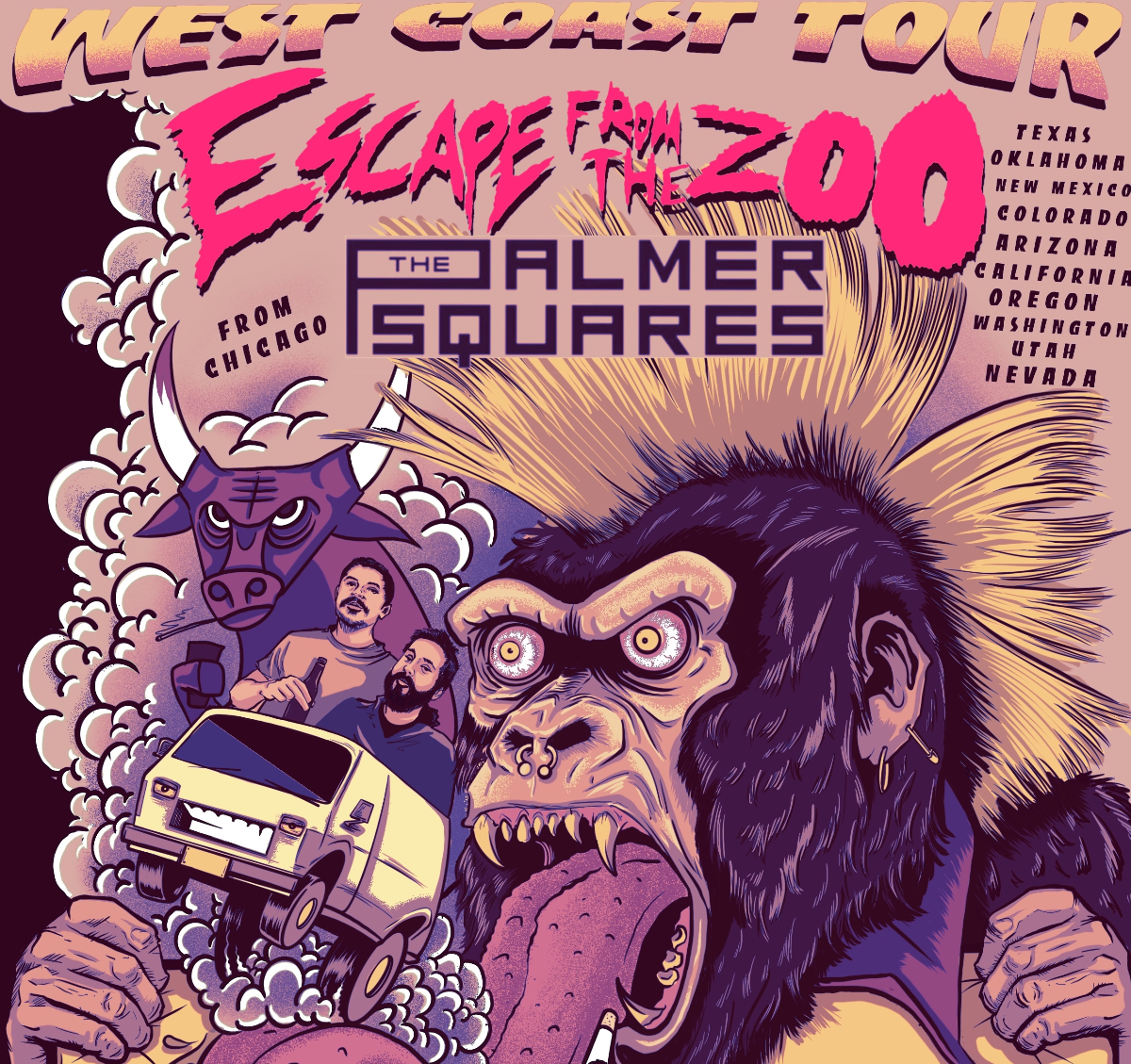Shaman's Harvest
"This was the hardest record we've ever made, on every level," says Nathan Hunt, referring to Shaman's Harvest's seventh LP.
The storyline seems obvious: The Missouri hard-rockers assembled this project during a global pandemic that debilitated the entire music industry. "Hard" has kinda been universal lately. But the road to Rebelator was even rockier than the band expected: natural disasters, logistical nightmares, an extreme case of collective writer's block. "We struggled the whole way," Hunt adds with a gruff baritone chuckle. "It was an interesting process for sure."
Every creative step seemed to be hampered by an outside distraction—or even act of God.
“A tornado ripped through our town, 2 miles from our studio, leveling everything in its path” recalls guitarist Josh Hamler. “Luckily, no one was killed. Everything can be rebuilt, but we completely lost our creative vibe following the tragic event”.
"There was so much stop and go," adds Hunt. "There was a flood. We'd have something scheduled, so we'd focus and be locked down for like a month at a time. Then somebody would have to go home, and it would be three weeks later before we'd start up again."
"Or we'd run out of money," Hamler adds with a laugh. "It was like Murphy's law at one point—like, Jesus, what else is going to go wrong in the making of this record?"
Luckily, they had time on their side. After a couple grueling years of touring behind their last album, 2017's Red Hands Black Deeds—a stretch that included numerous major rock festivals and runs opening for Nickelback and Seether—Shaman's Harvest were creatively and personally drained. "You try writing on the road, maybe go to the back of the bus and come up with an idea," Hunt says. "But it's hard to be inspired when you're tired. We were like, 'Let's just take the time off we need to make the record.' We didn't want to half-ass it."
So founding members Hunt and Hamler, along with guitarist Derrick Shipp and drummer Adam Zemanek—hit the reset button hard, clearing out six months for demo construction at their Jefferson City rehearsal space. This meticulousness marked a distinct change from their usual methodology—instead of slapping together outlines before entering the studio, they treated their first takes with a new level of sensitivity, fleshing out the pieces until they knew them intimately.
"We usually have a really rough idea going into the studio—maybe it's a verse, maybe it's a thought," Hunt says. "But we just write it on the fly and try to catch the magic. This time we wanted to approach it with some intention. We saw the demos all the way though, and that took a good, long pieces of time."
The process was fairly haphazard at first, as the band tried to regain their footing. With everyone on-hand (the non-Missouri residents were staying in the space itself), they'd all wake up and try to churn up ideas—though it was slow going for a bit. "We'd just sit there and noodle until the spark [was lit]," the frontman admits. "The first songs—some of them made the record, and some of them didn't. Some of the stuff wasn't up to par. We were sending stuff back and forth to the label, like, 'What do you think of this?' Just going from tour mode to creative mode, I had quite the block. I know everybody was like, 'I don't have anything.' Then it just erupted."
An early breakthrough was "Wishing Well," a signature rocker that pairs a detuned metal chug with a twangy, soaring chorus and subtle yet eyebrow-raising flourishes like fingerpicked acoustic guitar and experimental vocal effects. The ideas just kept flowing from there, with the band encouraged by producer Kile Odell, who joined them for a month to offer his feedback.
Shaman's Harvest were working with any musical seeds they could plant—like Hamler's droning guitar on "Bird Dog," which sprouted into a desert wasteland atmosphere of mouth harp, group percussion and deep, growling vocals. Hunt calls the final result a "weird mixture of things," blending its dust-blown textures with bits of Metallica and Queens of the Stone Age—the perfect backdrop for his almost post-apocalyptic lyrics.
"It's definitely a cinematic thing—if nothing else, it's a color or just one little scene in my head," he says. "In my head, I was envisioning a lot of these small towns, like a railroad town or a farm town where people don't want to farm anymore. And it just goes to shit, and then you have the opioids come in and everyone becomes a zombie."
When they arrived at lead single "Voices," a graceful balance of light and shade, the band instantly knew they'd written one of their best—a feeling cemented by their mutual celebration. "Once we had it all laid out and had a rough demo," says Hamler, "we listened back to the first time, and we all looked at each other and busted out laughing, like, 'Fuck yeah!'"
"It's one of those things that wrote itself," adds Hunt. "It needed an anthemic hum-along vibe. Everybody saw that song, which is pretty rare."
Though they ultimately found their momentum, some of the darkness from this era wound up informing their lyrics—though often indirectly. Breakup song "Flatline" documents an unspecified doomed relationship that, Hunt says, "just keeps on corroding" past its natural shelf life. "Wishing Well," the "epic of the record," zeroes in on the "predatory" and manipulative nature of some men. The band's own creative challenges even added to the overcast themes—"Just the frustrations of trying to make a record," Hunt notes with a laugh, "when the universe did not want you to make a record."
Shaman's Harvest persevered, of course, and wound up with their richest, most well-rounded album to date—a natural progression from Red Hands Black Deeds, 2014's Smokin' Hearts & Broken Guns and 2009's Shine, which featured the breakout single "Dragonfly."
In keeping with the spirit of those last three albums, the band aimed to, in Hunt's words, "de-genre-fy" their music—aiming beyond the rote contemporary rock-metal formula to add sublet arrangement quirks.
The loose yet professional atmosphere in St. Louis' Sawhorse Studios, where they hunkered down for a month with house engineer Jason McEntyre, helped them in that quest for experimentation.
"We were able to stretch our legs a little bit," says Hunt. "That's kind of a dying thing: people renting out whole studios, because it's expensive as fuck. The piano was [featured on an] Ike and Tina Turner record, and we were able to pick up on the vibes from that. Jason knew all the tricks of that room to experiment, Like using the talkback mic on the drums or using old tape machines."
A good example of their trial and error is "Lilith," a sonic jigsaw puzzle that pairs an Allman Brothers-style slide guitar with a distorted, drop-tuning riff and a tender piano outro.
"That song in particular has a Southern rock vibe in the slide, but there's also an industrial electronic feel in the percussion," Hunt says. "There's the acoustic vibe at the end with the piano. There's a lot of weird warbles going on. Especially in rock and roll, people seem to be afraid to add a fucking banjo or a mandolin under there. But when you think about the mix when it's done, those are the things that pop out. I think it's important that we de-genre-fy the rock culture and sound."
"We don't want to feel limited when we're in the studio," Hamler interjects. "We want to try things or take something that's out of the ordinary and find a way to make it work."
"Otherwise, how are you going to get anyone to pay attention these days?" Hunt adds. "Or even get yourself to pay attention? We're all artists, and nothing destroys art like monotony."
With tens of millions of streams, countless shows and acclaim from the likes of Metal Hammer, Classic Rock, Kerrang, BBC Radio, SiriusXM Octane, Loudwire, Guitar World and more, Brandon Yeagley [vocals], Chris Bishop
[guitar], Tim Peugh [bass], and Dan Ryan [drums] realize their vision like never before on their fifth full-length, Feel This [Released June 3 via Mascot Records].
Feel This is the follow-up to 2019s Top 10 Heatseekers album Motherbrain – whose cumulative streams have surpassed 30 million. 20 million of which were for the goliath single "Low Life" - a US Top 10 at active rock radio on the Billboard Mainstream with a 29-week run.
"This is the record we've been wanting to do ever since we started," exclaims Brandon. "We've always thought of ourselves as a live act," he continues. "When Jay Ruston described his process of recording, we were beyond excited about getting in and getting our hands dirty. It involved performing live as a unit and finishing all instruments on a song before moving on to the next. We recorded 16 songs in 21 days, which is a feat in itself."
Feel This is a tale of perseverance. "Through constant struggles, we learn more what it's like to be human. Our shortcomings and strengths alike make us a unique species," Brandon reflects. "Feel This very well may point to our biggest strength of all, our ability to feel emotion (for better or worse)."
Human nature is threaded throughout the album, from volatile relationships ["Dizzy"] to imperfections and learning from mistakes on "Holy Ghost." Its warbling harmony wraps around the wah-drenched guitar straight out of Seattle; Brandon's grunge-y wail rings out on the hook, "I am not the holy ghost. I won't ever save your soul." There's "believing in something so much" on "Set You Free," which spirals towards a seismic crescendo and emotionally charged guitar lead from Bishop.
Around the psyche-digging lyrics, they are never far away from thunderous rock 'n' roll. "Electrified" kickstarts the album as a rip-roaring livewire anthem. "It's your classic rock 'n' roll tune about Frankenstein boots and being invincible!" Brandon says. There's an epic anti-hero tale on "Without Wings," and then there's "Dance with the Dead." Forgetting your troubles over an irresistible groove, the song struts with high-register harmonies and the infectious chant of "Let's go dance with the dead. They know how to kill it!"
"Golden" is a soaring homage to a god-gone-too soon. "When it came to the lyrics, we collectively wanted it to be a tribute to Chris Cornell," says Brandon. "We're so influenced by everything he and Soundgarden have done. We ran with the song in honor of his legacy."
They made waves with Legend of the Spaceborne Killer [2012], Something Supernatural [2014], and Welcome To Fat City [2016]. However, Motherbrain [2019] represented a high watermark. They've crisscrossed the US and the world in road-warrior style, playing with the likes of Anthrax, Black Label Society, Chevelle, Clutch, Volbeat and more. They've lit up festival bills and the annual Shiprocked! Cruise. "We tour the pockets off of our pants and sleep in our van for half of the year. To some, that may seem like misery, but to us - it's Heaven baby!" the frontman says. Something they highlight on the new song, "Livin' on the Streets".
2019 ended with a US tour supporting Steel Panther, and then Covid19 punched the world in the face. As the Global Pandemic descended upon us, Chris and Dan hunkered down in Austin to jam and cut demos, sending ideas to Brandon back in Pennsylvania. 2021 saw the boys enter Orb Studios in Austin with producer Ruston [Stone Sour, Anthrax, Steel Panther]. Since the world has begun to open up, the band have not stood still. Rat Child EP was released last summer and featured a mighty cast of Frank Bello [Anthrax], Howard Jones [Light The Torch/ex-Killswitch Engage] and Stix Zadinia [Steel Panther]. They've also headed out on headline tours, played ass-kicking performances at festivals such as Rocklahoma, Aftershock, the Jericho Cruise and supported Halestorm.
You'll feel rock 'n' roll comes to life in Crobot's hands. "We never want to make the same album twice," Brandon leaves off. "There is something for every Crobot fan out there as well as newcomers. At the same time, we're having fun. We want to be taken seriously, but not too seriously—because this is monkey hour after all." "That's the fucking line right there," agrees Bishop. "We want you to walk away smiling. If I can make you smile, I've done my job."




